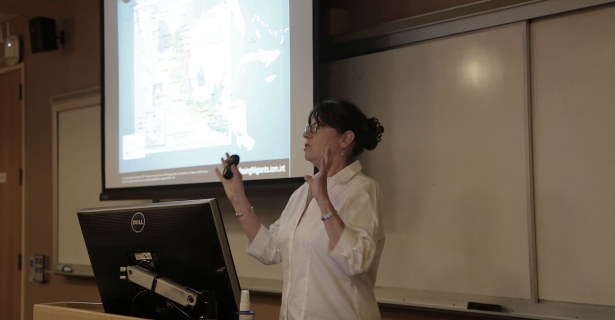On February 21st, 2018, Tufts International Development hosted the IGL Student Group Speaker Series on Migration. We brought Dr. Katrina Burgess, an Associate Professor of Political Economy at Fletcher, who has served as Assistant Director of the U.S.-Mexico Project at the Overseas Development Council in Washington, D.C., to speak to on “Beyond the US-Mexican Border: Human and Policy Challenges of Transit Migration through Mexico”.
She challenged some of the preconceived notions held by members of the audience, and the public at large. For example, statistics show that there are now more Mexicans leaving the U.S. to go back to Mexico then there are Mexicans coming to the U.S. Contrary to popular belief, she explained, Mexico is not a “sending country”, but rather a transit country. This means migrants, especially those from Central America and Haiti, are making the dangerous journey of traveling through Mexico to the U.S. border. There has been an increase in disappearances, deaths, rapes and other forms of violence. According to the Institute for Women in Migration (IMUMI) in Mexico more than 47,000 people have died in the past six years while attempting to cross the Mexican border to get to the U.S.
While, the number of people trying to cross the U.S.-Mexico border has increased, those attempting to cross are not primarily from Mexico. Dr. Burgess said the data is also showing an increasing number of young people and families migrating, including women and children.
Mexico itself has increased security at its border to the point where the U.S. southern border is sometimes referenced as having moved to Mexico's southern border. Migrants who cannot afford to take safer, more expensive routes, opt for the cheaper routes which are often quite dangerous.
Dr. Burgess argued the need for a paradigm shift when discussing modern migration. Migration, crime, and border control need to be seen as interactive and transnational; the laws and practices of one country affects more than just people within that one country. For example, the United States has a huge role in raising human costs of migrating and fueling a system of organized crime. By making it harder for people to legally migrate into the country, more people are forced to turn to smuggling as a means to enter the country. Because of the strong hold that gangs have throughout Mexico, part of the fees people pay the smugglers go straight to the gangs, adding to their wealth. Dr. Burgess points out, therefore, that it is important that we reexamine the categories we give people and note the distinctions between voluntary and forced migration. Many people migrating into our country have no other choice since they have been forced to leave their home country due to threat of sexual violence, extortion, or gang initiation.
In conclusion, Dr. Burgess suggested that we need to adopt a more humane approach when working with migrants fleeing hardship. This includes revisiting our immigration policies to better understand the situation of migrants entering the country.

